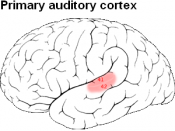Auditory Stimuli � PAGE �2�
<Name>
University of Phoenix Online
PSY 300 - Auditory Stimuli
<Instructor>
<Date>
�
Introduction
There are many different people in this world. Each individual has a different method for processing auditory information. This paper will break down the processing methods of the team members of Learning Team D as a whole. A consensus was met among the team due to a lot of similarities amongst the members of the team.
Open Dialogue
Paying attention to processing auditory information gives individuals the ability to be aware of their surrounding and personal task. Each teammate's reaction to auditory stimuli depends on environmental factors such as location, background noise or auditory interruptions. The personal factors that cause channels to change or switch gears are fatigue, medical problems, and hearing loss. Broadbent compares the mind to a radio because it receives many channels at once. Human attention is limited, and listening to two sounds at once will decrease the perception of what is being heard.
An individual has to choose whom they will talk with, whether it is everyone in a crowd or just one person. Teammate's reaction to auditory stimuli varies because people are different and deal with situations depending on prior experiences, education, background, and etc. One teammate is top down influenced, whereas she tunes out the environment or surrounding noises and completes her task. She can listen to one person and completely tune out what is going on around her even if her name is being called. Another teammate is influenced by bottom up concept, meaning that this individual might be great at conversations, but tends to get bored quickly and then pays attention to the crowd instead. Paying attention to the crowd and analyzing their behavior will register in short-term memory. Just as attention is...


